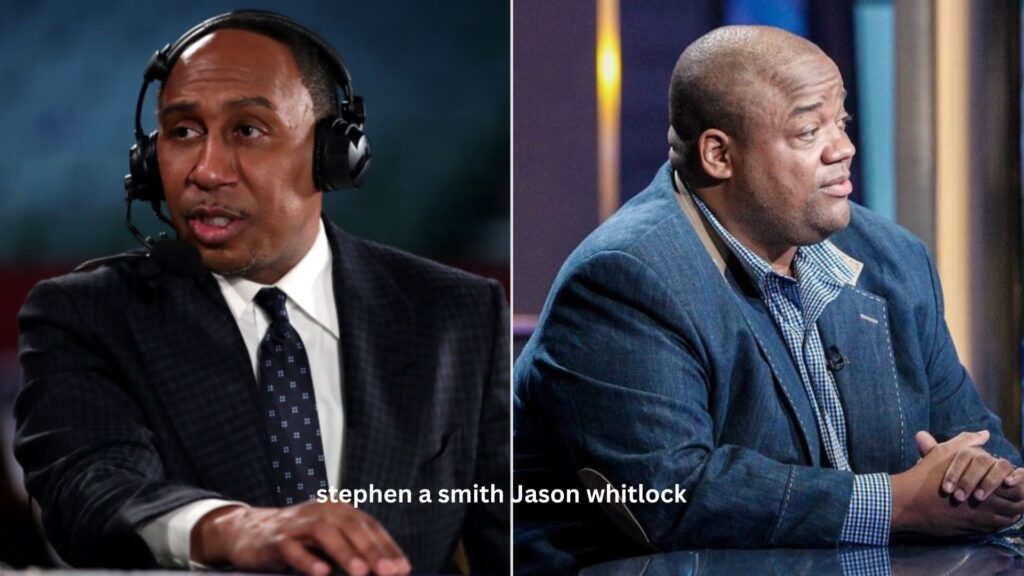Sports media is a dynamic arena filled with strong opinions, intense debates, and personalities that command attention. Among the most prominent figures in this space are Stephen A. Smith and Jason Whitlock. Both have carved out successful careers with unique approaches to storytelling and analysis. While they share a passion for sports, their methods, views, and public personas highlight the contrasting paths that can lead to prominence in the industry.
The Rise of Stephen A. Smith
Stephen A. Smith is a name that resonates with sports enthusiasts across the United States. Born in Queens, New York, Smith worked his way up from modest beginnings to become one of ESPN’s most recognizable faces. He began his career in print journalism, writing for the Philadelphia Inquirer and covering the Philadelphia 76ers. His sharp insights and fiery opinions quickly set him apart.
Smith’s breakthrough came when he transitioned to television. His work on ESPN programs like First Take has solidified his reputation as an outspoken and knowledgeable analyst. Known for his passionate delivery and larger-than-life personality, Smith often addresses sports issues with a blend of entertainment and expertise that captivates viewers.
A key element of Smith’s appeal is his versatility. He covers a wide range of topics, from basketball and football to broader cultural issues affecting athletes. His ability to engage audiences, combined with his willingness to tackle controversial topics, has made him a central figure in sports media.
Jason Whitlock’s Approach to Sports Commentary
Jason Whitlock’s career follows a different trajectory. A native of Indianapolis, Indiana, jason Whitlock began his journey in print journalism, writing for newspapers like The Kansas City Star. His work earned him a reputation as a thoughtful and provocative writer. Over time, jason Whitlock transitioned into television and digital media, gaining attention for his unfiltered commentary.
Jason Whitlock has worked with major platforms, including ESPN, Fox Sports, and Outkick. His commentary often focuses on the intersection of sports, race, and culture. Unlike Smith, who thrives on animated debates, Whitlock’s style leans more toward editorialized monologues and in-depth essays. He’s unafraid to challenge popular narratives, which has earned him both praise and criticism.
Jason Whitlock’s perspectives often spark heated discussions. He delves into topics that extend beyond the playing field, addressing societal issues through the lens of sports. This approach has made him a polarizing figure, with some applauding his courage to voice unpopular opinions, while others accuse him of courting controversy for attention.
Differences in Style and Audience Engagement
Smith and |Jason Whitlock represent two distinct styles of sports media. Stephen A. Smith thrives on energy, theatricality, and real-time debates. His catchphrases, quick wit, and ability to connect with viewers make him a household name. His audience often tunes in as much for the entertainment as for the analysis.
Whitlock, on the other hand, appeals to viewers seeking a more cerebral approach. His commentary is less about the performance and more about the substance of his arguments. Whitlock often positions himself as a contrarian, questioning mainstream viewpoints and challenging audiences to think critically about the issues he raises.
Both figures understand the power of their platforms. Smith’s reach extends to millions of viewers through ESPN’s vast network, while Whitlock’s digital presence allows him to connect with niche audiences who value his perspective. Their differing approaches highlight the diverse ways in which sports commentary can resonate with fans.
Public Reception and Controversies
Both Smith and Whitlock have faced their share of controversies. Smith’s outspoken nature occasionally lands him in hot water. From on-air comments that spark backlash to disagreements with athletes, he’s no stranger to public criticism. However, his ability to address these situations with transparency and humor often helps him maintain his fan base.
Whitlock’s controversies tend to revolve around his commentary on social issues. His critiques of athletes like LeBron James and Colin Kaepernick have drawn sharp responses from fans and fellow commentators. Critics argue that Whitlock’s views sometimes align with divisive rhetoric, while supporters praise his willingness to challenge the status quo.
Despite their controversies, both Smith and Whitlock have built loyal followings. Their ability to spark conversation, whether through agreement or disagreement, is a testament to their influence in sports media.
Impact on Sports Media
The careers of Stephen A. Smith and Jason Whitlock underscore the evolving landscape of sports media. They represent two ends of a spectrum—one focused on high-energy engagement, the other on provocative editorial analysis. Together, they illustrate how diverse voices contribute to a richer dialogue within the industry.
Smith’s presence has paved the way for a new generation of analysts who prioritize charisma and relatability. His ability to break down complex sports stories in an engaging manner sets a standard for what modern sports media can achieve. Meanwhile, Whitlock’s work highlights the importance of addressing broader societal issues through the lens of sports, challenging audiences to think beyond the scoreboard.
Conclusion
Stephen A. Smith and Jason Whitlock have left indelible marks on sports media, albeit in very different ways. Their contrasting styles, from Smith’s electrifying debates to Whitlock’s thought-provoking critiques, reflect the multifaceted nature of sports journalism. While they may not always agree with each other—or with their audiences—both have succeeded in shaping conversations and influencing the way fans engage with sports. Their legacies serve as reminders of the power of authentic voices in a competitive and ever-changing industry.

